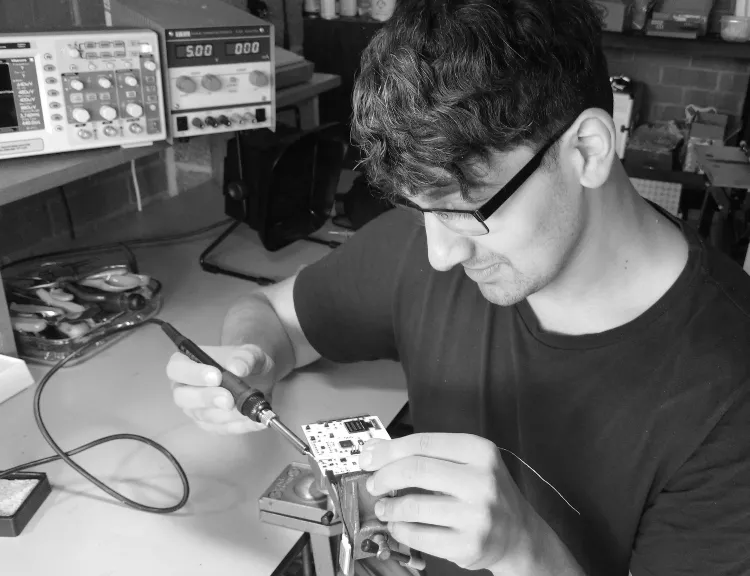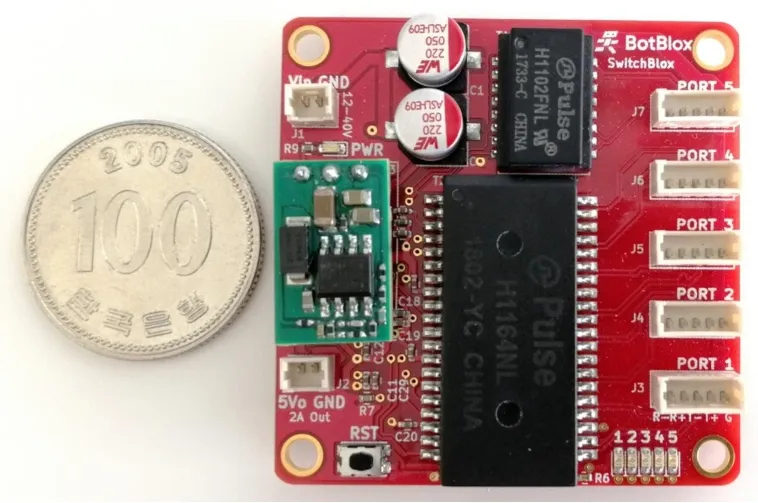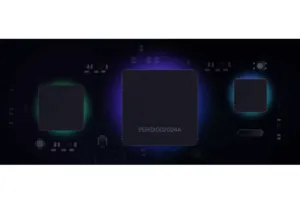
Today, we highlight Josh Elijah, a founder of Northampton-based UK electronics specialist BotBlox. The company builds ultra compact, rugged network and compute modules for anything, whether it should fly, swim or orbit. It uses Single Pair Ethernet (SPE), 10GBase-T, and a variety of hardware and firmware to enable faster data rates in tiny, low-power, and rugged form factors.
He was actually a member of our first year’s cohort, which was announced at the House of Commons in 2017. And Josh shows an almost ideal progression from BrightSpark to successful electronics entrepreneur, I learnt.
He also has a very inspiring message for young people entering into the world of electronics…
BotBlox and the rise of compact Ethernet

Success became clearly visible, for example, with a doubling of revenues across years, and the business is now set to hit $4 million in annual revenues in 2025. Its range of clients includes Lockheed Martin, NASA, Tesla and Boeing.
In total, the company employs seven people in Northampton. And his brother has also joined forces to help deal with the software side of things, such as firmware and machine learning.
Beginnings
But to start back in 2017… After an initial setback with a KickStarter-based Quadbot robot, which raised £48,000 but later had to be abandoned due to founder disagreements, Josh concentrated on electronics consulting. This was through his newly incorporated company, Kapek Ltd.
A variety of jobs led to work with electronics companies around the world. These included spells in Japan and China, where he encountered and learned about Far East manufacturing systems.
While working on one client project, he needed to fit an Ethernet switch into a small, mobile robot for a farming application. In Josh’s words, “there was nothing on the market and we would simply purchase Netgear switches and disassemble them, chop parts of the PCB and squeeze it into the robot we were building”. This gave him the idea to design a compact, embeddable Ethernet switch, which he then manufactured and released online: the SwitchBlox.
The first version of SwitchBlox is above. Josh designed it in his spare time and released it online.
Within a year, the first 100 units of SwitchBlox had sold out, and Josh was seeing orders from the likes of Boeing and Lockheed Martin. In his own words “clearly getting Ethernet working in small spaces was a big problem, and I wanted to be the one to solve that problem. I had no idea at the time that the drive for miniaturisation of Ethernet would be so strong.”
He then designed a three port, 1-inch version called SwitchBlox Nano and even a 1-inch gigabit version called GigaBlox Nano.
The rise of SPE also played into BotBlox’s hands, with its transmission of power and data via a single wire pair, for cost-effective, space-saving connections, and Josh also designed a range of SPE converters to cover 10Mbps, 100Mbps, 1Gbps and even 10Gbps on a single pair of wires.
Adding AI
And he has since been bringing AI into the mix by adding AI computing to BotBlox hardware. The rise in edge compute – and the demand for it on smaller, lower power systems – presents a huge opportunity, he said.
Much of BotBlox hardware, was already STM32 processors at first. This is to achieve Ethernet switch management capabilities without the power or size overhead of a fully fledged Linux processor
They now make use of some of the latest chips, including the NXP IM95, to achieve multi-cast and network management along with AI inference capabilities. This has led to the development of a SwitchCore, an 8 port switch and compute module with AI processing capabilities in a 25 x 25m x 12mm form factor.
In Josh’s words “the size and power profile of SwitchCore is low enough to be negligible but it packs a huge punch for embedded networking and AI computation!”
Made in America
What’s ahead? Well, BotBlox is now in the position of receiving a six-figure purchase order from a major corporation – Lockheed Martin. But it stipulates the product must be manufactured in the USA.
So he is currently investigating beyond contract manufacturing, and looking to setup his own facility in Brooklyn, New Jersey… (Manufacturing is currently spread across China, Thailand and the UK.)
R&D, however, will remain in the UK, he states.
Cisco of Drones
Basically, he wants BotBlox to be ‘the Cisco of drones’, he said. A default piece of the hardware jigsaw.
“We’re in a good spot,” he concluded. “We’re profitable without debt”. Equally important for Josh, he told me, is that he is still working as an engineer.
And his last message was one of hope to potential fellow BrightSparks: that now is a great time to be involved in electronics. To do consulting and find opportunities.
He strongly believes that large companies, with funding, are looking to invest in solutions that solve their problems. And this message is not heard enough in the UK.
It was great to talk to Josh Elijah again and hear about his career development.
See also: EW BrightSparks 2017 profile: Ryan Dunwoody, pi-top







